Share
Working at ESO
Are you interested in working in areas of frontline technology and in a stimulating international environment? Do you feel your profile matches our requirements? Learn more about our current vacancies and apply online. Read more..
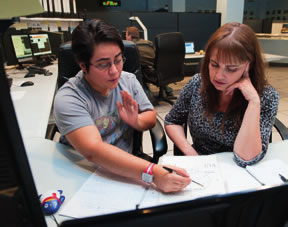
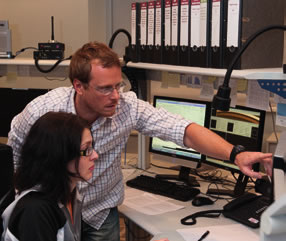

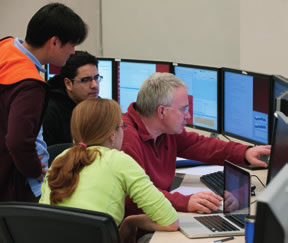
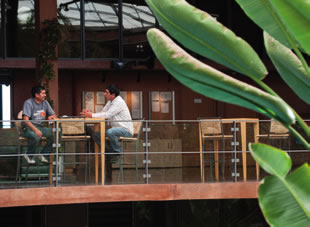

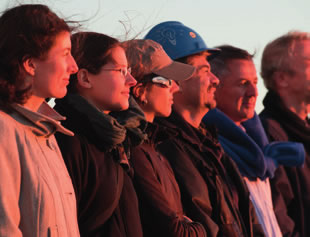

ESO Studentship Programme Chile 2018/2019
Santiago
Deadline 31/05/2018
Direct your research at one of the world's leading observatories
The research studentship programme of the European Southern Observatory provides an outstanding opportunity for PhD students to lead their research in the vibrant scientific environment at one of the world's leading observatories for a period of up to two years.
ESO is the foremost intergovernmental astronomy organisation in Europe, offering one of the most collaborative and stimulating scientific settings anywhere in the world. Its approximately 110 staff astronomers, 40 Fellows and 40 PhD students conduct frontline research in fields ranging from solar system research, asteroid and comets, solar and stellar physics, astroparticle physics, exoplanets, astrobiology, galaxy and galaxy clusters, cosmology, theoretical astrophysics, large-scale structures simulations, and fundamental physics.
ESO's studentship positions are open to students enrolled in a PhD programme in astronomy or related fields (observational, theoretical and fundamental astrophysics). Students accepted into the programme work on their doctoral project under the formal supervision of their home university and come to ESO to work and study under the co-supervision of an ESO staff astronomer - normally for a period of between one and two years. Studentships may be hosted either at ESO's Headquarters in Garching (Germany) or at the offices in Santiago (Chile).
Applicants and their home institute supervisors should agree upon and coordinate their research project jointly with their prospective ESO supervisor. For this purpose the ESO supervisor should be contacted well in advance of the application deadlines (31 May and 15 November 2018). A list of potential ESO supervisors and their research interests can be found at http://www.eso.org/sci/activities/personnel.html.
ESO students in Chile will have the opportunity to visit the observatories and to get involved in small technical projects that equip them with hands-on skills and give them insights into the observatory operations and instrumentation, providing them with unique experiences that can benefit their future careers. Such involvement is also strongly encouraged for Garching students. ESO students at both sites benefit from a dynamic multi-disciplinary and collaborative environment among the students and fellows who stay in touch with the latest scientific developments and have the opportunity to network with top researchers visiting ESO. In addition, students in Garching may attend and benefit from the series of lectures delivered in the framework of the International Max-Planck Research School on Astrophysics. ESO students also have the possibility to join in many outreach activities.
Students who are already enrolled in a PhD programme in the Munich area (e.g., at the International Max-Planck Research School on Astrophysics or a Munich University) and who wish to apply for an ESO studentship in Garching, should provide a compelling justification for their application.
If you are interested in enhancing your PhD experience in an international and culturally-rich environment, grow your network of potential collaborators and generally consolidate your scientific profile through an extended stay at ESO, then please apply by completing the web application form available at http://recruitment.eso.org/.
Please include the following documents in your application:
- a cover letter;
- a curriculum vitae, including a list of publications, if any;
- copies of your university transcript and certificate(s) or diploma(s);
- a summary of your master's thesis project (if applicable) and ongoing projects, indicating the title and the supervisor (maximum half a page);
- an outline of the proposed PhD project (recommended one page, maximum two), containing a clear timeline including the start and expected end dates of the PhD, and the requested starting date and duration for the studentship at ESO. The candidate should also highlight the advantages of coming to ESO in the project description;
- the names and contact details of your home institute supervisor and the ESO local supervisor. They will be automatically invited to submit a recommendation letter, however, applicants are strongly advised to trigger these invitations (using the web application form) well in advance of the application deadline;
- a letter from the home institute that: i) guarantees financial support (salary, health insurance and travel money) for the remaining PhD period after the termination of the ESO studentship; ii) indicates whether the prerequisites to obtain the PhD degree at the home institute have already been met.
All documents should be typed in English (but no translation is required for the certificates and diplomas).
Depending on the number of available positions, there might be up to two application rounds per year, with closing dates for applications on 31 May 2018 and 15 November 2018. Hence the next application round will close on 31 May 2018 . Review of the application documents, including the recommendation letters, begins immediately following after the deadline. Incomplete or late applications will not be considered.
Candidates will be notified of the results of the selection process within two months following the deadline. Studentships considered in the May round will normally begin between August 2018 and March 2019; students for the November round in March-August 2019.
Further information
For more information about the studentship programme please see: http://www.eso.org/sci/activities/FeSt-overview/ESOstudentship.html.
For a list of current ESO staff and fellows, and their research interests, please see: http://www.eso.org/sci/activities/personnel.html. A list of PhD projects currently being offered by ESO staff can be found at: http://www.eso.org/sci/activities/thesis-topics.html. Details on the employment conditions and benefits are available at: http://www.eso.org/public/jobs/conditions/students/.
For further general information about studentship applications, please see our Frequently Asked Questions - FAQ: http://www.eso.org/sci/activities/FeSt-overview/ESOstudentship/StudentshipFaq.html.
Questions not answered by the above FAQ page can be addressed to:
For Garching: Eric Emsellem, email: eric.emsellem@eso.org.
For Chile: Claudio De Figueiredo Melo, email: cmelo@eso.org.
For a perspective on the studentship programme from past and current ESO students, please watch this ESOcast episode: http://www.eso.org/public/videos/esocast149a/
No nationality is in principle excluded however, recruitment preference will be given to nationals of Australia, Austria, Belgium, the Czech Republic, Denmark, Finland, France, Germany, Italy, the Netherlands, Poland, Portugal, Spain, Sweden, Switzerland and the United Kingdom and, for Chile, to students enrolled in a South American university irrespective of gender, age, disability, sexual orientation, race or religion.
